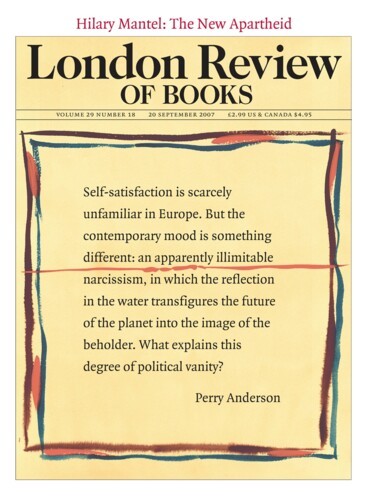Sex seems to have been momentarily eclipsed as a topic for French literature, giving way to something sexier: trauma. Camille Laurens and Marie Darrieussecq, two authors who until now have shared a publisher (P.O.L.), began exchanging blows last month in the literary pages of all the major papers over Darrieussecq’s latest novel, Tom est mort, a first-person narrative of a mother’s attempt to come to terms with the death of her small child ten years earlier. In 1995 Laurens had published Philippe, an autobiographical work about the death of her infant son the previous year. Darrieussecq has not lost a child. Laurens suspects both Darrieussecq and their common editor of having hidden Tom est mort from her; she first read it as a member of a prize jury. Laurens feels that Darrieussecq has committed an act of ‘psychological plagiarism’. Reading the novel, she writes, made her feel as though it had been written in her own bedroom, as though Darrieussecq were an uninvited guest, a squatter in her psyche. She has, in other words, stolen Laurens’s trauma.
Darrieussecq had been a fan of Laurens, and even claimed in an interview published in June that her admiration for Philippe in particular had led her to choose P.O.L. as her publisher. Darrieussecq is also a psychoanalyst. Laurens feels that this makes matters worse, since, according to her, what literature and psychoanalysis have in common is the search for truth, and truth is not about taking other people’s discourse. But literature is and has always been precisely about taking other people’s discourse.
None of this would have happened in the 19th century, when literature, like life, was full of dead children, and no one thought to check Dickens’s credentials when he killed off Little Nell. But infant mortality rates aside, the main reason this skirmish could not have occurred in the 19th century is autofiction – a 20th-century invention.
The term ‘autofiction’ was coined in the 1970s by Serge Doubrovsky to define his own works, which combine features of fiction and autobiography. Narrated by someone with the same name and outward characteristics as himself, they were nonetheless fictional, he explained, in that other people’s names were changed and he reserved the right to recount whatever he liked without regard to biographical accuracy. The phenomenon itself, of course, predates Doubrovsky, and it is no coincidence that the coiner of the term started out as a Proust scholar. A la recherche du temps perdu is probably the earliest example of autofiction (which is why it was initially criticised for its strange hybrid nature). Céline, Henry Miller, Colette and Jean Genet followed; and autofiction has gained something of a stranglehold on French literature in the decades since Doubrovsky named it.
Over the past decade or two this trend has given rise to many works of remarkable intimacy, at times to great effect (Hervé Guibert’s poignant and disturbing Aids trilogy), at times producing narratives of stupendous banality. Most fall between the two, but even at its best the mode has its dangers. Camille Laurens is one among the hundreds of practitioners of autofiction in France today, and her publisher notes that he bears the scars of several lawsuits to prove it. People have objected to being depicted, even under fictional names, ever since Proust spent his spare time writing letters to Laure Heyman trying in vain to convince her that she was not the model for Odette de Crécy. Laurens herself is such a firm believer in autofiction that she seems to feel literature – at least trauma narrative – should consist in nothing else: one should not write about the death of a child if one has not lost a child, she says, just as there is no reason to write about having Aids when there are writers around who actually suffer from the disease.
Marie Darrieussecq and her publisher have responded with the usual pronouncements about artistic freedom. But Darrieussecq has also signed up to the autofictionalisation of literature to the extent that she defends herself by agreeing that one does not write about such a subject without a personal connection, that all her works have been filled with dead children, and that her own mother lost a child. She might have added that the novel that launched her career, Truismes (1996), a dystopic fable whose narrator spends the book gradually transforming into a sow, was not based on personal experience, nor, presumably, would even Laurens have required it to be.
A journalist for Libération noted that plagiarism in publishing is like incest in families, the direst possible accusation. One prominent autofictionalist, Christine Angot, has founded an entire career on writing about her incestuous relationship with her father. Outraged by the fact that people were upset at finding thinly veiled versions of themselves in her works, she wrote a book, Une partie du coeur (2004), defending herself with reference to Rimbaud’s useful dictum je est un autre, which she maintains is the very essence of literary artistry and, what’s more, can be understood only by those who understand what the incest taboo is about.
Send Letters To:
The Editor
London Review of Books,
28 Little Russell Street
London, WC1A 2HN
letters@lrb.co.uk
Please include name, address, and a telephone number.

